
What is Lina.review?
Lina.review is the platform for reviewing on Blockchain, utilizing blockchain’s immutability to produce the best possible transparency and creating conditions for reviewers to benefit from providing quality reviews, as well as easily and directly interact with users and providers of products or services totally trustless.
Lina is not just a website but it is a Blockchain-based platform so that everyone can build their own review system to develop community and manage their own businesses. All Lina-based review channels are globally connected.
Value of online product review
With the explosion of the Internet, product reviews have become an important factor in building brand image and business reputation. A negative review can seriously affect the reputation of the business. This has even created an industry known as “reputation management” with the primary functions of helping companies “concealing” bad reviews. However, from the users’ perspective, this is not a good thing because it hinders them in accessing transparent and trustful reviews. In Martin Lindstrom’s marketing book “Buyology”, he wrote about “mirror neurons” neuronal reflections: neurons that fire when an action is being performed and when that same action is being observed.
He stated that this is related to the fact that the user when deciding to buy a product is often influenced by the interaction and review of other users of the product. According to the statistics from Pew Research Center, more than 50% of US adults under 50 years of age regularly consult online product reviews before deciding on spending. In another survey conducted by the Center, 82% of adults in the United States said they “sometimes” read online reviews before making a purchase decision, and 40% of interviewees said they always or almost always read online reviews

Difficulties in finding and comparing evaluation results
At present, there are many rating systems in different industries. These systems are quite dispersed resulting in difficulty for users to search reviews. For example, there are many rating websites for technological equipment such as phones or laptops. Each of them has its own advantages/disadvantages, making it difficult to find reviews and almost impossible to gain experience from the previous reviewers.
Lack of standard criteria for each subject
One product is usually rated as “Good” or “Not Good”, at the option of users. This is expressed quite clearly on websites providing scale-based rating with a large number of users. Take IMDB (the leading movie database website) as an example, the rating of 10 points or 0 point of movies, which have many viewers, are a lot, especially for controversial films. Or Rotten Tomatoes — the most appreciated review website, also gives users the choice of either “Rotten” or “Fresh”. Netflix — the largest movie streaming service — has also deprecated its star-rating system (from 0 star — 5 stars) and replaced it with “thumb up / thumb down. One of the reasons for this change, at the option of Netflix, is that scale-based rating is decided by feelings and does not help customer feedback analysis. In fact, the satisfaction or dissatisfaction of customers with products or services comes from many different factors and details of those products or services. However, most users do not realize where their satisfaction or dissatisfaction came from when reviewing. And yet, when being asked specifically about a criterion, they will immediately recognize that it is the cause of their positive or negative review.
For example, for movies, many people acknowledged that the appearance of an actor/actress in the movie has a big impact on whether they like the film. Therefore, it is necessary to build standard criteria for each subject in order to help business get the most accurate feedback from customer. Thanks to the assistance of a network of experts in many industries, Lina.review has introduced a set of criteria applied to more than 20 fields ranging from technological products, medical services or hotels, to movies and books. In addition to being able to get the most accurate feedback from users about the selected criteria, Lina.review has introduced the Lina Rating app (available on Google Play) so that users can “vote” for the criteria to be reviewed, currently for 6 subjects:
• Medical Service, Hospital
• Hotels
• Movie
• Restaurant
• Crypto Currency
• Smart Phone
The obtained results are fairly interesting, for example, for restaurants, the number of people voting for “Cleanliness” is greater than the number of people voted for “Food Quality”, and the number of people voting for “Ambience” and “Food safety” is nearly equal to “Food Quality”. This partly indicates that existing restaurant review criteria need to be updated.
Solutions
By being implemented on Blockchain technology, Lina.review will address issues related
to transparency and immutability of the score, as well as develop mechanisms to help users
and experts earn profits based on system development and the quality of their reviews (via
smart contract).
For Helpers
Experts (hereinafter referred to as Helper) mean those users who are qualified and will review products and services on the system. When viewing products or services, Helpers’ reviews shall be displayed separately.
There are 2 options to become a Helper:
• Sign up with Lina.review by attaching CV, proof of domain knowledge, personal value, etc. The applicant is only considered as a Helper after being approved by the Helper Board. Please note that in the later stages of the system, when Lina.review has grown, the approval for being a Helper will be very strict due to the useroriented assessment of the system.
• Publish lots of quality reviews, which are widely accepted (like/agree). After reaching the specific level, the reviewer will be promoted to Helper. Note that depending on the size of the system that this threshold will also increase accordingly.
The Helper will be entitled to receive a substantial portion of the advertising revenue or registration fee (up to 50%) depending on their fields. The above-mentioned parameter is only applied to Lina.review, and that of other Lina blockchain based review systems could configure their own incentive and revenue sharing policies.
It is the responsibility of the Helper to monthly submit a certain number of reviews with an acceptable quality (based on factors such as the number of like/agree from users). In case where the Helper fails to satisfy these conditions in two consecutive months (configurable), they will be demoted down to common user.
For Common Users
Common users mean those who are using the Lina.review system to search the information on products and its reviews as well as write their own review and assessment. Common users can become Helpers through the above-mentioned options. Common users may be distributed system revenue for their review and assessment work, depending on configuration. Specifically, for the system Lina.review, the common users will not receive system revenue for their review and assessment. With other review systems running on the Lina blockchain platform, the revenue sharing for the user shall depend on each configuration. For System Builders on the Lina Platform Individuals or companies wishing to build a review system on the Lina blockchain Platform could easily do this. Participation is free but the Lina Platform will charge based on the
activities on the system, namely the participation of merchants, advertising as well as rating activities themselves. When these private systems come into operation, 10% of system revenues (from advertising
or merchant participation fees) will be used to administer and operate the Lina Platform.

Advertisers will utilize LINA tokens to advertise on system. Advertising revenue will be shared to participants in the following rates: (Note: figures can be changed/configured)
• Operating and administration expenses: 10%
• Helper: 50% depending on industries. For example, if advertising revenue comes mostly from car manufacturers, Helper in the field of automobile will be distributed more. This does not mean that Helpers in the field that have no advertising revenue will not be shared, it is just that they are given less tokens.
• Large Token Holder: 40% — Holders of large numbers of tokens (> 1 million tokens) will be shared 40% of the advertising revenue in accordance with percentage of tokens. The division of revenue will be held every 6 months. When advertising on Lina.review, the businesses will approach to the right targeted subjects because when the users are interested in reading reviews in any fields, the advertising of these fields will be displayed. For Lina.review and LINA token systems, revenue from advertising is very important, as it generates three values:
• Create demand for LINA tokens, especially from businesses with high financial capacity.
• Create benefits for those who directly create the value of the system (Helpers), thereby increasing the quality of reviews resulting in increase of system’s value and higher advertising revenue.
• Create a Network Effect to attract users and helpers to evaluate in the system, thereby increasing the value of the system and leading to higher advertising revenue.
Business Landscape
Competitors
• Metacritic: A website that reviews movies and games which is known as the largest rating system of its kind in the world. Many publishers are using Metacritic scores to evaluate product quality as well as give bonuses to producers. However, it is accused of being influenced by large corporations, especially in the games industry.
• IMDB: The world’s largest database system of movies. It has the function of reviewing movies but this is not the main function.
• Rotten Tomatoes: the highest rated review website for movies with a large number of qualified movie experts. However, the experts themselves are rarely replaced, which makes it difficult to maintain consistent quality.
• Yelp: Review system for restaurants. Services and many other fields. Focus primarily on the US market.
• TripAdvisor: A system for review of hotels and travel services around the world. In addition, users are also able to book rooms online.
• Techradar: A system for reviewing technology products such as phones and laptops etc.
The strengths of Lina compared to the current system
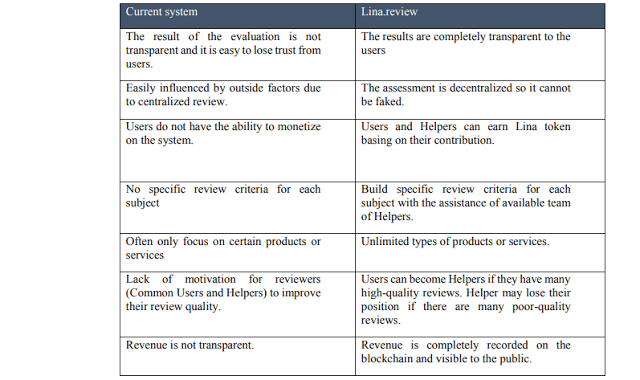
The Lina Token (LINA) is the native token of the Lina Platform. It will be ERC-20 token based on Ethereum, a blockchain-based decentralized platform for applications that run exactly as programmed without any chance of fraud, censorship or third-party interference to facilitate online contractual agreements in a cryptographically secure manner. The total number of LINA token created will be 900,000,000. 33.33% of all LINA tokens (300,000,000) will be available for sale to the public in the LINA Token Generation Event. 66.67% of all LINA tokens (600,000,000) will be locked in Smart Contract to be released annually over 10 years (60,000,000 Token per year).
The Lina Bridge
The Lina Bridge is a sidechain bridge service for the Lina Core blockchain network to synchronize bids, payment transactions and to interact with the LINA Token smart contract on the public Ethereum network.
Tokens between the private chain platform and the Ethereum blockchain could be dynamically interchangeable. As such, the balance of the ETH smart contract (LINA Token) could be equal to the liquidity of the tokens inside the private chain. Locking mechanisms in smart contracts should be implemented to ensure the consistency of the balance in user wallets between public and private platforms.
The LINA User Profile
LINA users mean those who are using review services on the Lina Platform to search the information on products and their reviews as well as write their own reviews and assessments. Each user will have their own profile where they can input their interests and preferences. User levels (Common or Expert) can be determined by the owner of the review service. In order to receive token rewards, users will need to register valid addressesto receive LINA tokens.
The Review System
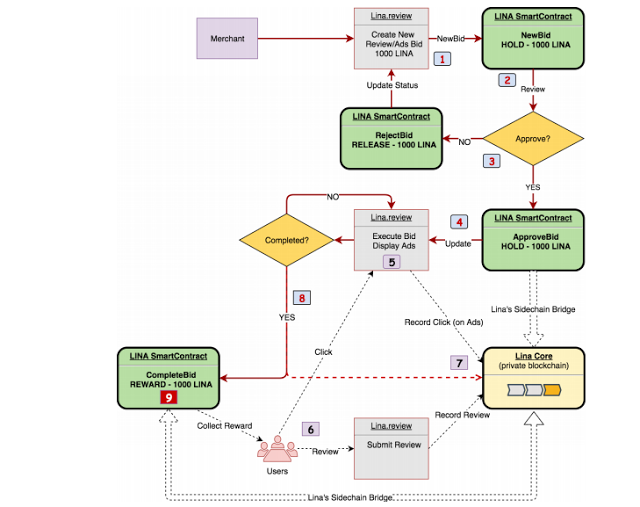
This is an example walk-through of a bid for advertising request from a Merchant and the reward sharing flows:
1. The Merchant places a new product review request or a new advertising campaign bid on the Lina.review website by providing campaign details (links, conversion goals, …), for example 1000 clicks at the price of 1000 LINA (1 LINA per click).
2. The Merchant deposits 1000 LINA to smart contract to place the bid. 1000 LINA then will be locked and the bid is waiting for approval.
3. Lina.review staff reviews and approves the bid. In case the bid is rejected, deposit amount will be refundable to the merchant.
4. Once the bid gets approved, Lina.review service will be notified to execute the bid.
5. The bid gets executed on Lina.review website based on campaign parameters.
6. Whenever a user clicks on the ads link, the click will be recorded on the Lina Core private blockchain.
7. Whenever a user clicks submit a review, the review details will be recorded on the Lina Core private blockchain. Note that the review could be subject to being approved by Lina.review staff or by votes from Helpers.
8. The Lina.review service will periodically check transactions on the Lina Core private blockchain and bid configurations to determine if the campaign is fully executed or expired.
9. Once a bid is fully executed or expired, the LINA smart contract will be called with statistical information to calculate fee(s) and revenue sharing distribution to users and LINA token holders. In case the bid is partly executed, the remaining amount (if any) will be refundable to the merchant.
Bid status on the public chain will be synchronized to the Lina Core private blockchain by the Lina Bridge.
Token Generation Event (TGE)
Token Allocation
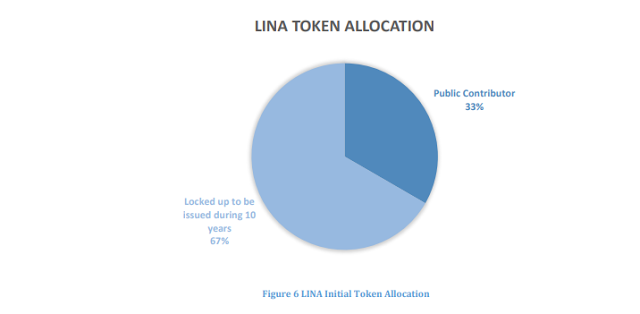
Roadmap
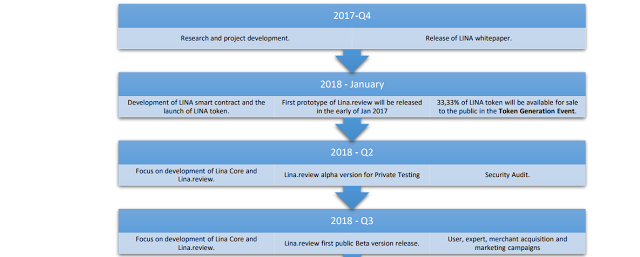
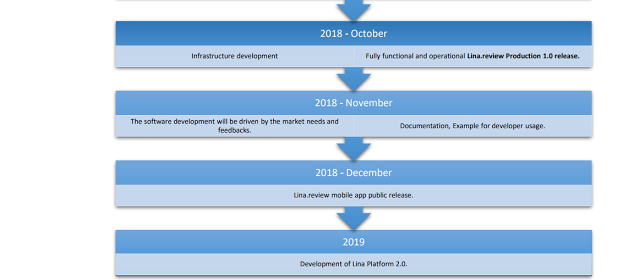

If you want to know more about LINA, please go to link below …!
Website : https://lina.review/
Whitepaper : https://lina.review/lina_whitepaper.pdf
Twitter : https://twitter.com/lina_network
Author : araalfaris
Bitcointalk Profile : https://bitcointalk.org/index.php?action=profile;u=1116890
Tidak ada komentar:
Posting Komentar